- Regulatory Status
- RUO
- Other Names
- Interferon-gamma-inducing factor, IGIF, IL-1g, IL18, IL1F4
- Ave. Rating
- Submit a Review
- Product Citations
- publications
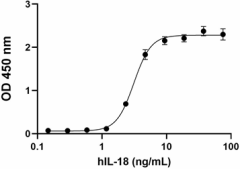
-

Recombinant human IL-18 induces the production of IFNγ in KG-1 cells in a dose dependent manner. The ED50 for this effect is 1.5 – 9.0 ng/mL. -

Stability Testing for Recombinant Human IL-18. Recombinant human IL-18 was aliquoted in 10mM DTT, 1mM EDTA and 10% Glycerol, PBS, pH 7.2 at 0.2 mg/mL and one aliquot was kept at 4°C (Control), and another was frozen and thawed four times (4x Freeze/Thaw). The samples were tested by their property to induce the production of IFNγ in KG-1 cells in a dose-dependent manner. The ED 50 for this effect is 1.5 – 9.0 ng/mL.
IL-18 was first identified as IFN-βinducing factor (IGIF). It is a member of the IL-1 family of cytokines and similar to IL-1β, IL-18 is initially synthesized as an inactive precursor without a signal peptide and is cleaved into the mature form by activated caspase 1. Caspase I-independent maturation of IL-18 is induced by FASL. Mature IL-18 binds directly to the IL-18 receptor alpha chain and then recruits IL-18 receptor beta chain to form a high affinity complex. The high affinity complex recruits MyD88 and leads to IRAK/TRAF6 pathway activation and NF-κB nuclear translocation. IL-18 in combination with IL-12 shows a synergistic effect on IFNβ production. Without costimulation, IL-18 alone does not induce IFNβ production. IL-18 can induce IFNβ production from splenocytes, liver macrophage, T lymphocytes and natural killer cells. IL-18 also enhances the production of GM-CSF and IL-12. IL-18 enhances Th1 cell development by synergizing with IL-12 and promotes Th2 cell differentiation in the presence of TCR activation. IL-18 plays a major role in autoimmune and inflammatory diseases. It has been implicated in many diseases such as eczema, psoriasis, inflammatory bowel disease, metabolic syndromes, hemophagocytic syndrome, sepsis and acute kidney injury. Blocking of IL-18 activity has been an attractive therapeutic approach for autoimmune disease. It has been shown that neutralization of IL-18 has reduced both intestinal IFNβ and TNFα production and resulted in a dose dependent reduction in colitis severity in mice. IL-18 is also able to induce angiogenesis, migration, proliferation and immune escape, and has been associated with cancer. Several publications show that IL-18 gene polymorphism may be risk factors for several cancers.
Product DetailsProduct Details
- Source
- Human IL-18, amino acids Tyr 37-Asp193 (Accession# NP-001553) was expressed in E. coli.
- Molecular Mass
- The 157 amino acid recombinant protein has a predicted molecular mass of approximately 18 kD. The DTT-reduced and non-reduced protein migrates at approximately 18 kD by SDS-PAGE. The predicted N-terminal amino acid is Tyr.
- Purity
- >95%, as determined by Coomassie stained SDS-PAGE.
- Formulation
- 0.22 µm filtered protein solution is in 10mM DTT, 1mM EDTA, and 10% Glycerol, PBS, pH 7.2
- Endotoxin Level
- Less than 0.01 ng/ per µg cytokine as determined by the LAL method.
- Concentration
- 10 and 25 µg sizes are bottled at 200 µg/mL. 100 µg size and larger sizes are lot-specific and bottled at the concentration indicated on the vial. To obtain lot-specific concentration and expiration, please enter the lot number in our Certificate of Analysis online tool.
- Storage & Handling
- Unopened vial can be stored between 2°C and 8°C for up to 2 weeks, at -20°C for up to six months, or at -70°C or colder until the expiration date. For maximum results, quick spin vial prior to opening. The protein can be aliquoted and stored at -20°C or colder. Stock solutions can also be prepared at 50 - 100 µg/mL in appropriate sterile buffer, carrier protein such as 0.2 - 1% BSA or HSA can be added when preparing the stock solution. Aliquots can be stored between 2°C and 8°C for up to one week and stored at -20°C or colder for up to 3 months. Avoid repeated freeze/thaw cycles.
- Activity
- The ED50 is 1.5 - 9 ng/ml, as determined by a dose-dependent induction of IFNγ secretion by KG-1 cell.
- Recommended Usage
-
Bioassay
- Application Notes
-
BioLegend carrier-free recombinant proteins provided in liquid format are shipped on blue-ice. Our comparison testing data indicates that when handled and stored as recommended, the liquid format has equal or better stability and shelf-life compared to commercially available lyophilized proteins after reconstitution. Our liquid proteins are verified in-house to maintain activity after shipping on blue ice and are backed by our 100% satisfaction guarantee. If you have any concerns, contact us at tech@biolegend.com.
- Product Citations
-
Antigen Details
- Structure
- Cytokine.
- Distribution
-
The major sources of IL-18 are macrophage and dendritic cells. IL-18 precursor is constitutively expressed in endothelial cells, keratinocytes, and intestinal epithelial cells. It is also expressed by renal parenchymal cells (tubular epithelial cells, podocytes, and mesangial cells).
- Function
- IL-18 is essential for both innate and adaptive immunity. IL-18 induces synthesis of TNF, IL-1, Fas ligand, and several inflammatory chemokines. VEGF-D increases the expression and the secretion of IL-18 from gastric cancer cell lines. IL-18 binding protein (IL-18BP) binds to mature IL-18 with high affinity and prevents its interaction with IL-18Ra. IL-1F7 is a negative regulator of IL-18. IL-18 mRNA is induced by stress and bacteria in adrenal cortex and mouse osteoblasts respectively.
- Interaction
- CD4 and CD8 lymphocytes, NK cells, splenocytes, smooth muscle cells.
- Ligand/Receptor
- IL-18 receptor (heteromeric complex of alpha and beta subunits).
- Biology Area
- Cell Biology, Immunology, Neuroinflammation, Neuroscience
- Molecular Family
- Cytokines/Chemokines
- Antigen References
-
1. Okamura H, et al. 1995. Nature 378:88.
2. Siegmund B, et al. 2001. Am. J. Physiol. Regul. Integr. Comp. Physiol. 281:R1264.
3. Rodriguez-Galán MC, et al. 2005. J. Immunol. 174:2796.
4. Alboni S, et al. 2010. J. Neuroinflammation 7:9.
5. Dinarello CA, et al. 2013. Front. Immunol. 4:289.
6. Fabbi M, et al. 2015. J. Leukoc. Biol. 97:665. - Gene ID
- 3606 View all products for this Gene ID
- UniProt
- View information about IL-18 on UniProt.org
Related FAQs
- Why choose BioLegend recombinant proteins?
-
• Each lot of product is quality-tested for bioactivity as indicated on the data sheet.
• Greater than 95% Purity or higher, tested on every lot of product.
• 100% Satisfaction Guarantee for quality performance, stability, and consistency.
• Ready-to-use liquid format saves time and reduces challenges associated with reconstitution.
• Bulk and customization available. Contact us.
• Learn more about our Recombinant Proteins. - How does the activity of your recombinant proteins compare to competitors?
-
We quality control each and every lot of recombinant protein. Not only do we check its bioactivity, but we also compare it against other commercially available recombinant proteins. We make sure each recombinant protein’s activity is at least as good as or better than the competition’s. In order to provide you with the best possible product, we ensure that our testing process is rigorous and thorough. If you’re curious and eager to make the switch to BioLegend recombinants, contact your sales representative today!
- What is the specific activity or ED50 of my recombinant protein?
-
The specific activity range of the protein is indicated on the product datasheets. Because the exact activity values on a per unit basis can largely fluctuate depending on a number of factors, including the nature of the assay, cell density, age of cells/passage number, culture media used, and end user technique, the specific activity is best defined as a range and we guarantee the specific activity of all our lots will be within the range indicated on the datasheet. Please note this only applies to recombinants labeled for use in bioassays. ELISA standard recombinant proteins are not recommended for bioassay usage as they are not tested for these applications.
- Have your recombinants been tested for stability?
-
Our testing shows that the recombinant proteins are able to withstand room temperature for a week without losing activity. In addition the recombinant proteins were also found to withstand four cycles of freeze and thaw without losing activity.
- Does specific activity of a recombinant protein vary between lots?
-
Specific activity will vary for each lot and for the type of experiment that is done to validate it, but all passed lots will have activity within the established ED50 range for the product and we guarantee that our products will have lot-to-lot consistency. Please conduct an experiment-specific validation to find the optimal ED50 for your system.
- How do you convert activity as an ED50 in ng/ml to a specific activity in Units/mg?
-
Use formula Specific activity (Units/mg) = 10^6/ ED50 (ng/mL)
 Login / Register
Login / Register 







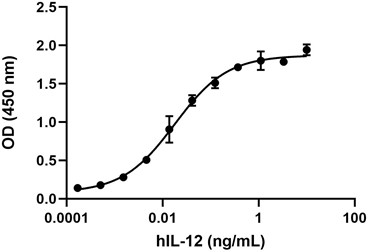
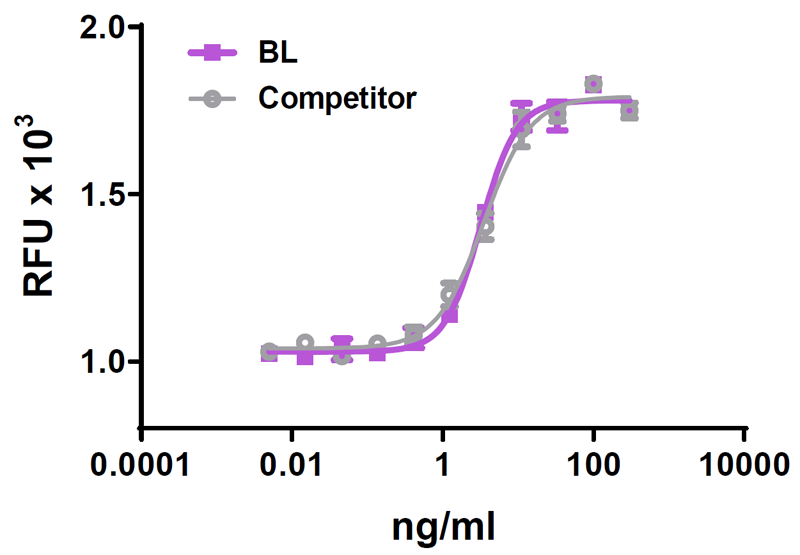
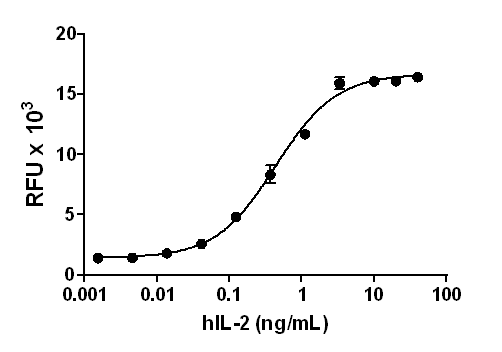
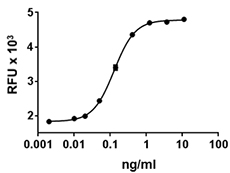



Follow Us